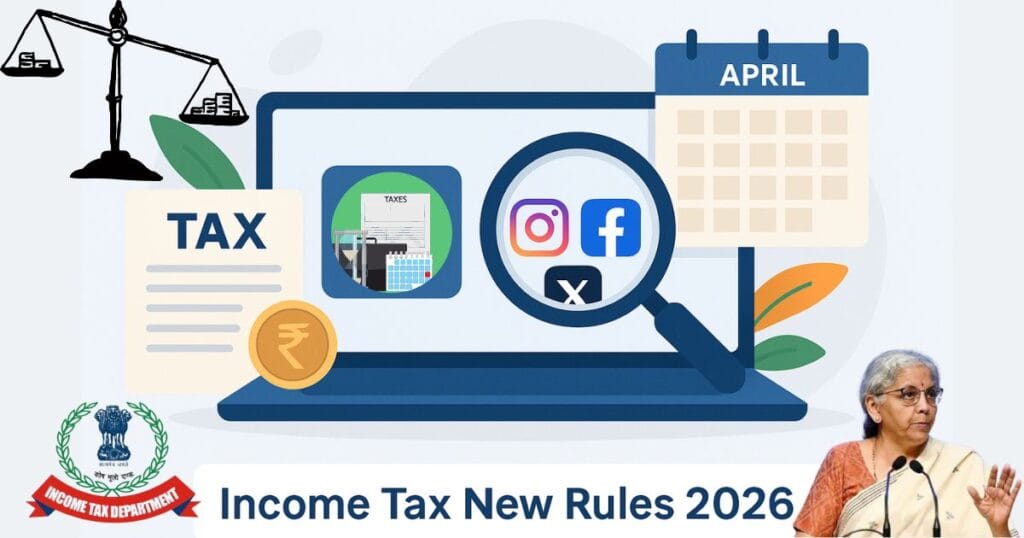Have you heard that starting April 1, 2026, the Income Tax Department may monitor your email and social media? Yes, under the Income Tax Bill 2025, new rules will come into effect to curb tax evasion. However, this does not mean that everyone will be spied upon. These rules will target those who hide income while living a lavish lifestyle. If you pay your taxes honestly, there is nothing to worry about. This article will explain the Income Tax New Rules 2026 in simple language so you can understand how it may impact your life and how to stay safe.

Why will the Income Tax Department monitor your email and social media?
The primary goal of the Income Tax Department is to prevent tax evasion, which occurs when people hide their real income from the government and pay lower taxes. Under the new rules, the department will monitor individuals who show low income in tax filings but display a luxurious lifestyle.
For example-
- If you post photos of foreign vacations, luxury cars, or big houses on Instagram while showing low income in your tax return, the department may get suspicious.
- If your emails reflect the purchase of expensive items, money transfers abroad, or large transactions, these could be flagged.
Example- Suppose Rahul reports an annual income of ₹600,000 in his tax return but posts pictures of Maldives trips and a new BMW on social media. The tax department will question how such expenses are possible on a low income, and Rahul could face scrutiny.
What are these new rules, and when will they be implemented?
Implementation Date
These rules will be effective from April 1, 2026, marking the start of the financial year 2026-27. From this date, the tax department will have the authority to access your digital activities, including emails, social media, and bank accounts, but only in cases of suspected tax evasion.
Under which law?
These rules will fall under the Income Tax Bill 2025, which will replace the Income Tax Act 1961. Section 247 of this bill will grant tax authorities the right to access your digital data like emails and social media, but only for suspicious cases.
Who will be monitored?
Not everyone will be under watch. The tax department will focus on people who:
- Show low income but spend lavishly.
- Are celebrities, influencers, or large business owners.
- Make large transactions in cryptocurrency, stock markets, or real estate.
Privacy Concerns
Your privacy is protected under Article 21 of the Indian Constitution and Data Protection laws. The tax department cannot access your data without valid reasons and legal permissions. However, some people are concerned about privacy impacts, while the government claims it is solely to prevent tax evasion while following due process.
What will the Income Tax Department monitor?
The department will monitor digital activities, focusing on:
Emails
- Bills/invoices of expensive purchases.
- Conversations about sending or receiving money abroad.
- Large transactions, like buying or selling property.
Social Media
- Photos of luxury cars like BMW, Audi, Mercedes.
- Pictures of foreign vacations (Dubai, Maldives, Switzerland).
- Luxury jewelry, designer clothes, and expensive items.
Platforms
- WhatsApp Status, Instagram posts, Facebook photos, and tweets on X (formerly Twitter).
- Online shopping and cloud storage data.
Example- If you post your new Rolex watch on WhatsApp Status while showing low income in your tax file, the tax department may inquire about its purchase.
Will your privacy be impacted?
Privacy Protection- Your privacy is protected by the Indian Constitution and data protection laws. The tax department cannot monitor your email or social media without valid legal reasons. Your daily activities, chats with friends, and family photos remain safe.
Monitoring Limits- Only individuals suspected of tax evasion will be monitored, not common activities of ordinary people.
For common taxpayers- If you pay taxes on time and your expenses align with your income, you have nothing to worry about. However, avoid excessive show-off on social media.
Example- Sheila, a middle-class woman who files taxes regularly and lives a simple life, will not face issues. But if she starts posting new designer sarees every week on Instagram, the department may inquire.
How will the Income Tax Department take action?
If suspicious activities are found, the department will
- Send a notice requesting details of your income and expenses.
- Verify your social media posts, emails, and bank data against your ITR (Income Tax Return).
- Penalties if tax evasion is proven, including
- Fines
- Interest payments
- Legal action
Example- Rohan declares an income of ₹500,000 but posts Maldives vacation photos on X. The department will ask how he managed these expenses on low income. If he cannot explain, he may face fines.
Who should be extra cautious?
The following individuals need to be more careful
- Celebrities and influencers displaying a luxurious lifestyle on social media.
- Frequent travelers abroad posting photos from luxury hotels and resorts.
- High-value investors in cryptocurrency, stock markets, or real estate.
Example- If an influencer posts their new Mercedes on Instagram but shows low income in tax filings, the department will scrutinize them.
How to avoid being under the tax department’s radar?
Follow these easy tips
- File accurate tax returns: Report all your income and expenses truthfully.
- Maintain expense records: Keep bills, receipts, and bank statements for reference.
- Be cautious on social media: Avoid unnecessary show-offs; post luxury photos only if such expenses are reflected in your tax filings.
Example- If you buy a new car, keep the invoice and loan records so you can explain the purchase if questioned.
THE INCOME-TAX BILL, 2025 OFFICIAL
Are these rules applicable to everyone?
Yes, the rules will apply to all taxpayers, but the focus will remain on those showing low income but high spending.
For low-income earners- If your lifestyle is simple and your income is low, you need not worry. The department will not monitor minor expenses.
Focus Areas
- Foreign travel
- Expensive jewelry
- Luxury cars
Example- A middle-class family going on an annual vacation will not be flagged. But frequent foreign trips with low income declared may attract scrutiny.
What should taxpayers do?
To stay safe
- Keep proper records of income and expenses.
- Respond to notices calmly with appropriate documents.
- Consult a tax advisor if your income involves business, shares, or crypto.
Example- If you receive a notice about your foreign trip, prepare passport, travel bills, and income documents for response.
Should you be worried?
For honest taxpayers- If you file correct taxes and your expenses align with your income, there is no need to worry. These rules are to catch tax evaders, not to trouble ordinary people.
Be cautious on social media- Avoid excessive show-off with luxury purchases or foreign trips, as it may draw the department’s attention.
What do people say- Some fear these rules may impact privacy, but the government states it is only for preventing tax evasion while respecting privacy.
Example- If your income and expenses align, stay confident. If you post luxury items frequently, ensure your tax filings reflect your lifestyle.
Comparative Table: Who will be affected and what to do?
| People | Impact | Action |
|---|---|---|
| Celebrities/Influencers | More scrutiny on social media | Reduce show-off, consult tax advisors |
| Frequent travelers | Checks on foreign expenses | Maintain travel and expense records |
| Crypto/Stock investors | Large transactions monitored | Show transactions in tax filings |
| Common people (low income) | Minimal checks, caution advised | File taxes correctly, maintain records |
ALSO READ- New PAN-Aadhaar Linking Rules 2025: Full Guide
Conclusion: Stay Confident, but Stay Alert
The Income Tax New Rules 2026, effective from April 1, 2026, are designed to prevent tax evasion. If you pay taxes honestly and maintain records of your income and expenses, there is no need to worry. However, exercise caution on social media and consult a tax advisor when needed. These rules target those hiding income from the government, not ordinary people.
What you should do
- Keep accurate records of income and expenses.
- File your tax returns on time.
- Avoid unnecessary show-off on social media.
- Consult a tax advisor if you receive a notice.
Will the Income Tax Department monitor everyone’s social media under the new rules?
No, under the Income Tax New Rules 2026, the department will not monitor everyone’s social media or emails. They will only check digital activities in cases of suspected tax evasion, such as when someone shows low income in tax returns but displays a lavish lifestyle on social media. If you pay your taxes honestly, you do not need to worry.
What can I do to avoid getting a tax notice under the new monitoring rules?
To avoid a tax notice:
File accurate and timely tax returns.
Maintain records of your income and expenses.
Avoid unnecessary luxury show-offs on social media if they are not reflected in your tax filings.
Consult a tax advisor if your income is complex (business, crypto, shares).
These steps will help you stay compliant under the Income Tax New Rules 2026.
Will my privacy be impacted by the Income Tax New Rules 2026?
The government states that your privacy will be protected under Article 21 of the Indian Constitution and data protection laws. The Income Tax Department cannot access your personal emails or social media without a valid reason. Monitoring will only happen in cases of suspected tax evasion, ensuring that normal activities and personal chats remain private.


